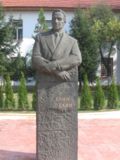
This is a list of famous or notable Bulgarians throughout history.
Contents
- Bulgarian monarchs
- Performing arts
- Directors
- Actors
- Models
- Dancers
- Journalists
- Television
- Literature
- Authors
- Music
- Composers
- Singers and musicians
- Visual arts
- Architects
- Painters
- Sculptors
- Others
- Business
- State
- Politicians
- Revolutionaries
- Voivodes
- Academics
- Economists
- Philosophers
- Sports
- Athletics
- Boxing
- Chess
- Volleyball
- Football
- Tennis
- Other sports
- Theology
- Cuisine
- Criminals
- Gallery
- See also
- Notes

























